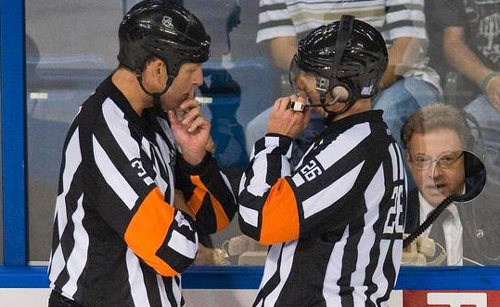Challenge system draws strong first impression from coaches and goalies

Original Source: The Canadian Press
Posted on: Oct 15, 2015
TORONTO - Throughout Jonathan Bernier's career, referees have skated to him and apologized for missing a goaltender interference call in a previous game. He gets it.
"That's just part of hockey," the Toronto Maple Leafs goaltender said. "It's such a fast game, and they can't be in great position all the time."
In the first game under the NHL's new coach's challenge system for goaltender interference and offside situations, Montreal Canadiens forward Tomas Plekanec interfered with Bernier. Some quick work from Leafs assistant Andrew Brewer led to coach Mike Babcock initiating the first challenge and Jeff Petry's goal being overturned.
"Babs looks like a star and he didn't do a damn thing," St. Louis Blues coach Ken Hitchcock said the morning after. "He just stood on the bench and looked bewildered — typical Babs."
The Blues weren't as fortunate when they tried a few days later. Teams are 2 for 5 on coach's challenges through the first week under the new system — 2 for 4 on goalie interference and 0 for 1 on offside plays.
The first impression of challenges, valid only on goals scored with potential goaltender interference or offside plays, is that it'll take plenty of goals off the board and that coaches will be aggressive in using them.
"If we think there's even a 50 per cent chance, we're going to take the risk," Hitchcock said. "If there's a chance that it can turn in our favour, we're taking the chance and damn the timeout because it's the most overrated thing."
The Leafs and San Jose Sharks, who negated a goal by the Capitals' Dmitry Orlov on Tuesday night in Washington, have been successful so far in getting goals overturned. Babcock credited Brewer for the move, while San Jose's Peter DeBoer pointed to "eye in the sky" assistant Johan Hedberg and video coach Dan Darrow.
"I'm just the puppet calling the timeout and telling them what we're challenging," DeBoer told reporters in Washington.
For Babcock, it's not so much being a puppet as delegating. He said Brewer, who worked with him with Team Canada at the Sochi Olympics and with the Detroit Red Wings, did plenty of preparation along with video analyst Adam Jancelewicz and hockey operations director Bradley Holland over the summer for these situations.
"Ideally if it can help us, let's do it," Babcock said.
It can definitely help the goalies. Bernier and fellow Leafs goalie James Reimer said a handful of goals against might not count thanks to coach's challenges.
"I think they would be the first ones to tell you it's great for the referees, too," Bernier said. "We all make mistakes, and obviously that can change momentum of the games."
It changed momentum of the Sharks-Capitals game, even though some players complained that there wasn't sufficient contact between Jay Beagle and goaltender Martin Jones to take the goal away. Beagle appeared to brush Jones as the puck was going by, and referee Tim Peel said the goalie wasn't able to do his job.
"Any incidental contact, call it. That's the standard that seems to be set now," Capitals coach Barry Trotztold reporters. "I don't have to agree with it, but if that’s the standard, then you're going to get a lot of challenges from the coaches around the league."
Rederees determining a standard for these subjective calls is crucial to how effective coach's challenges will be. Capitals goaltender Braden Holtby said he considers getting bumped part of the game, but perhaps the slightest contact will lead to goals being wiped out.
"It's not even a game of inches, it's a game of millimetres," Reimer said. "You get bumped on the skate lightly and he knocks you off balance for a half-second and the puck goes in."
Reimer said he can tell from another goalie's body language if he gets interfered with. Goalies probably don't have to skate over to the bench to tell coaches to challenge.
"I think they want to see my reaction if I get pushed in or if I get interfered (with)," Bernier said. "It happens so quick for them to see if they want to review the video or not, so you've got to show them something so they can actually go upstairs and see if there's anything."
For the Sharks, that's Darrow and Hedberg checking in with assistant Steve Spott on the bench and making the decision. Other teams will likely use similar communications systems to figure out when to challenge goals.
As for timeouts, Hitchcock said some coaches are going to save them or use them on icing plays to give players a rest. Babcock said he'll never save it just in case he needs it to challenge.
"I'm going to use my timeout whenever we need it," Babcock said. "That could be in the first period. What I've found: Over time, if you save things and you don't use them, you look back and you wonder why."
CLICK HERE to read original article
